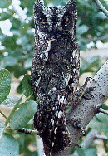
Visit Kypros-Net a new WEB source on Cyprus


Belongs to the Strigidae family. It is an indigenous species and remains on the island all year round. It represents a widespread species which has many allied races, the best known being the European bird which is a passage migrant.
During daylight hours it is seldom seen, hidden in some well-foliaged tree showing evident preference for olive, pine or maple trees. Once the night begins- to fall, its well-known cry can be heard especially on moonlit nights.
It nests in hollow trees, deep walled wells or empty buildings. Even when perched it is hard to see as it sits very still and upright. You may discern it as your attention is arrested by the staring gaze oF its weird bright yellow eyes sunken in grey-brown feathers.
It appears as a greyish bird with fine vermiculations of grey-blown. Two ear tufts which are sometimes raised and the white streaks about its shoulder are conspicuous But the most characteristic feature is its wailing cry, a lament that brings back to memory the tragic story related to the origin of this bird. According to legend, the bird was originally the son of a poor peasant family who lived at the edge of a forest. He tender the garden and sheep while his younger brother looked after the horses. One day, when the younger brother was in the forest a severe storm arose. The boy returned home and when the elder brother counted the horses he found that one was missing. He did not count the horse on which his brother was riding. Flying into a rage, he ordered his brother to return to the forest and find the presumed lost horse. There, in the unleashed storm, the young boy was struck by a lightning. When later that night his horse returned home without him, his brother was full of apprehension. He went out in search of him, shouting his name "Ghioni", "Ghioni" but to no avail. At daybreak, when to his utter distress he realized that his brother was dead, he asked Artemis, the Goddess of the forests and of hunting, to release him of his torment. The Goddess turned him into an owl. To this day, the owl flies through the forest all night long calling "Ghioni". "Ghioni" for his lost brother. Incidentally, the modern Greek noun for owl is "ghionis" and the same word resembles the call of the owl.
In Cyprus there is a widespread belief that the scops owl is one of the oldest birds in the world. In the medieval folk songs the owl is mentioned as being contemporary to the creation of the world.
"P' afns ektistnv tz' ibwtos tz'
etheliwthnv kosmos.
totes edeixtnv to thoupiv tz' ai to s'
eliovatziv"
(The owl and the swallow have existed ever since the construction of the ark and the creation of the world.)
At present it is carefully protected a.s it is valuable in destroying rodents and large harmful insects.